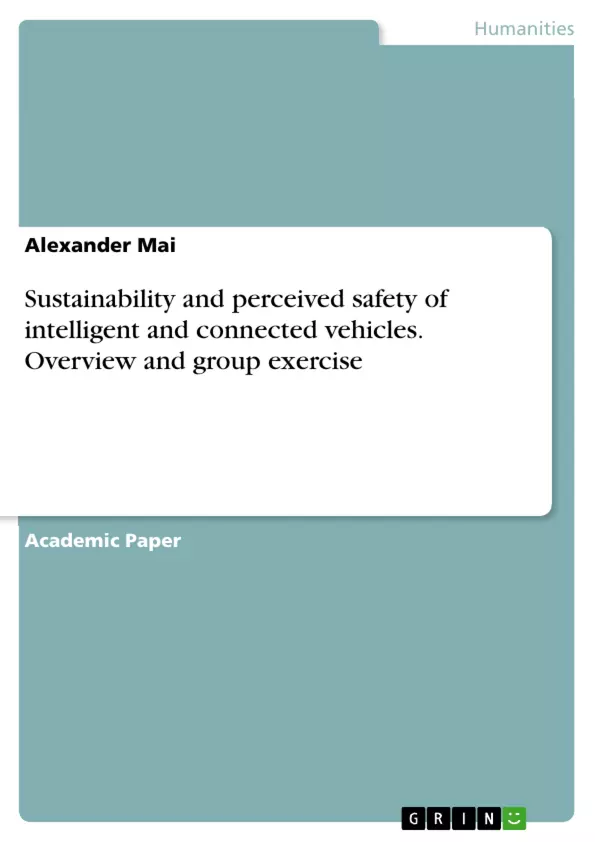The interest in autonomous vehicles is growing in today's society. Current developments regarding a more sustainable transportation infrastructure continue to drive interest and thus research in the field of autonomous driving. Furthermore, sustainability questions are increasingly concerning humanity and the goal of 1.5° degrees seems almost impossible to achieve.
How could technologies, such as autonomous driving, lead to a more sustainable environment? What risks and problems could arise for people if implemented, and are people even willing to use autonomous vehicles as an everyday means of transportation? These are the questions that this paper aims to shed light on over the next few pages.
Inhaltsverzeichnis (Table of Contents)
- Introduction
- Intelligent and connected vehicles (ICVs)
- Sustainability aspects of ICVS
- Safety aspects of ICVS
- Conclusion
- Group exercise
- Introduction to the topic
- Case study 1: Who is holding us back?
- Case study 2: Understanding the current state
- Reflection and conclusion
- References
Zielsetzung und Themenschwerpunkte (Objectives and Key Themes)
This paper aims to explore the potential of intelligent and connected vehicles (ICVs) to contribute to a more sustainable environment. It examines the sustainability and safety aspects of ICVs, considering both potential benefits and challenges. The paper also analyzes the societal impact and ethical dilemmas related to the integration of ICVs.
- Sustainability aspects of ICVs
- Safety aspects of ICVs
- Societal acceptance and perceived risks of ICVs
- Ethical dilemmas and social justice considerations in relation to ICVs
- Impact of ICVs on urban infrastructure and sustainability
Zusammenfassung der Kapitel (Chapter Summaries)
- Introduction: This chapter introduces the growing interest in autonomous vehicles and the potential of ICVs to contribute to a more sustainable transportation infrastructure. It also raises key questions about the environmental impact, societal acceptance, and ethical implications of ICVs.
- Intelligent and connected vehicles (ICVs): This chapter provides an overview of ICVs, defining different levels of autonomy and discussing the potential benefits of ICVs in terms of improved mobility, road safety, and environmental sustainability. It highlights the role of the Internet of Things (IoT) in ICV technology and discusses the potential impact of ICVs on urban landscapes.
- Sustainability aspects of ICVS: This chapter delves into the sustainability dimensions of ICVs, highlighting both direct and indirect impacts. It explores the potential for energy efficiency and reduced emissions through ICVs, as well as the potential for shared mobility models to reduce car ownership and traffic congestion. The chapter also acknowledges potential challenges, such as energy costs associated with server infrastructure for data processing.
- Safety aspects of ICVS: This chapter examines the safety implications of ICVs. It discusses the potential for ICVs to significantly reduce accidents caused by human error, emphasizing the advantages of ICVs in terms of adherence to traffic rules, avoidance of distractions, and removal of human factors such as impaired driving. However, the chapter also raises concerns about ethical dilemmas, liability issues, and potential biases in decision-making algorithms.
Schlüsselwörter (Keywords)
This paper explores key concepts related to intelligent and connected vehicles (ICVs), focusing on sustainability, safety, societal acceptance, and ethical considerations. It examines various themes including autonomous driving, transportation infrastructure, environmental impact, shared mobility, urban design, social justice, and the role of technology in shaping our future. The paper also addresses the potential challenges associated with ICV implementation, such as potential biases in algorithms, ethical dilemmas related to decision-making, and the need for responsible governance and regulation.
Frequently Asked Questions
How can autonomous driving contribute to sustainability?
Intelligent and connected vehicles (ICVs) can improve energy efficiency, reduce emissions through optimized driving, and support shared mobility models that decrease car ownership.
What are the safety benefits of ICVs?
ICVs can significantly reduce accidents caused by human error, such as distraction or impaired driving, by strictly adhering to traffic rules and using advanced sensors.
What ethical dilemmas arise with autonomous vehicles?
Ethical concerns include liability in case of accidents, potential biases in decision-making algorithms, and social justice issues regarding access to technology.
What is the role of IoT in ICV technology?
The Internet of Things (IoT) enables vehicles to communicate with each other and with urban infrastructure, which is essential for coordination and safety in autonomous systems.
Are people willing to use autonomous vehicles?
The paper examines societal acceptance and perceived risks, noting that willingness often depends on trust in technology and perceived safety benefits.
- Citar trabajo
- Alexander Mai (Autor), 2022, Sustainability and perceived safety of intelligent and connected vehicles. Overview and group exercise, Múnich, GRIN Verlag, https://www.grin.com/document/1297685



